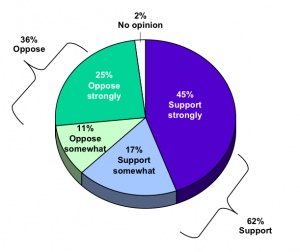
Nearly half of people surveyed in a poll released today say an unhealthy diet combined with lack of physical activity are the greatest health risks facing California children today.
In addition, almost three in four respondents to the Field Poll -- 73 percent -- said prevention efforts, while starting with the family, must extend to the broader community, including health care providers, schools, community organizations and beyond -- to food and beverage companies and fast food restaurants.
"Voters acknowledge they have a role to play," Mark DeCamillo, Director of The Field Poll told me. "They should be involving the larger community and lots of different entities, companies included should be taking some responsibility in reducing obesity in kids.
The poll surveyed 1,000 registered California voters and was funded by The California Endowment. (The California Endowment is a supporter of KQED). Respondents across political parties, ethnic backgrounds and household incomes all agreed a poor diet and sedentary lifestyle are the major health risks to children. Illegal drug use was a distant second at 22 percent.
More than half of respondents (60 percent) said that the neighborhood where a child is raised makes a difference in their health. A strong majority (68 percent) said a comprehensive program to prevent childhood obesity -- including building parks and promoting neighborhood safety -- would be worth it, even if it cost billions of dollars.
